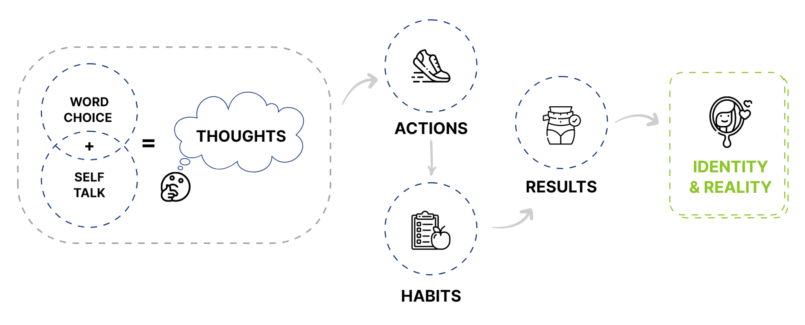The Self Sabotage Cycle And How It Impacts Your Ability To Lose Weight

The self sabotage cycle is in action when you set a goal for yourself and then engage in any behavior that undermines your goal. What makes the self sabotage cycle so frustrating is that often these behaviors that undermine our goal often happen subconsciously. For instance, when you set a goal of making more conscious and intentional food choices to feel your best. Yet, you find yourself halfway into a pint of ice cream at 9:00 PM, this is the self sabotage cycle.
This article will help to bring clarity to where and how the self sabotage cycle is playing out in your life. We will explore why this is occurring, and provide practical steps you can take to break this cycle. By do so you can lose weight and keep it off for good.
Different Forms of Self Sabotage
The self sabotage cycle may be initiated by a myriad of differentiated behaviors that undermine us.
From the experts at Positive Psychology, “self-sabotage occurs when we destroy ourselves physically, mentally, or emotionally or deliberately hinder our own success and wellbeing by undermining personal goals and values (Brenner, 2019).”
For example, when you’re trying to lose weight and keep it off, you convince yourself that you can skip exercise. You tell yourself that you’ll “always be overweight” or “can’t do this” when you reach a plateau on the scale. This leads to you throwing in the towel (mental), or remaining inactive when stress, anxiety, or overwhelm present themselves. This ultimately leads to these emotions hijacking your decision making (emotional).
In addition to occurring physically, mentally, or emotionally, these behaviors may occur consciously or subconsciously. It depends on our level of awareness about the problem at hand.
From our friends at Positive Psychology once more:
“Self-sabotage can be conscious or unconscious depending on the level of awareness. An example of conscious self-sabotage is deciding to eat cake, despite a goal to eat healthily. Unconscious self-sabotage happens when a personal goal or value has been undermined but not initially recognized.”
Why Do We Self Sabotage?
In my decade of experience, I’ve found the biggest reason that self sabotage occurs is due to fear.
And, surprisingly, not fear of failure, rather, fear of success.
Think about it like this. If you’ve struggled with your weight for a significant period of your life, it becomes a part of your identity. Your identity is the collection of your self-talk, thoughts, beliefs, actions, and results.
The biggest threat to our ego is a change in identity.

Yet, when seeking to lose significant weight and keep it off, we must change our identity, by first prioritizing a mindset shift and changing our self-talk and belief systems.
This is a major threat against our ego, therefore, several changes will be initiated (first at the subconscious level) to get in our own way, so to speak, and prevent a change in results and outcomes, which ultimately influence a change in identity.
Examples of Self Sabotage Impacting Your Ability To Lose Weight
Self sabotaging behaviors show themselves in many ways when you’re trying to lose weight.
One example may be you quickly rationalizing with yourself over whether to indulge in a high-calorie favorite treat of yours by saying something similar to, “It’s only one” or “I’ve had a good day – I deserve it.”
I call this a case of the “I deserve its.”
Can you relate?
These decisions may seem inconsequential at the moment, but the problem begins when they happen over and over. Sometimes, far more often than we care to admit.
Similarly, you may convince yourself that you cannot workout today because you’re too tired or sore. You skip meal prep for this week because you believe you’ll be able to navigate making one meal at a time.
Oh, how foolish we can be when our self sabotaging selves are running the show…
Ultimately, we see one of these forms – or another – occur after a little bit of progress has been made. We begin to inch closer and closer to that goal (and new identity) just close enough that our ego starts to feel a bit threatened. As a result, our ego calls in the calvary to start sabotaging our efforts toward continued weight loss to keep up out of the danger zone.
How to Get Out of The Self Sabotage Cycle
Getting out of the self sabotage cycle is no easy feat, but it’s possible.
It’s important to remember that the self sabotage cycle is born out of a long period of time (often years or decades) of a consistent theme of self-talk, thoughts, and beliefs running in the background. To change your identity and get out of this vicious cycle, it’s important to cut off the negativity at its source: your self-talk and beliefs.
Reminder: this will take time. If it took years to get to where you are today don’t expect it to take days to undo this. For instance, if it’s taken you five years to gradually accumulate the 30 pounds of excess weight you’d like to lose, you can’t expect to lose it all and keep it off in a matter of weeks. Patience and persistence will be key.
The first key ingredient to get out of the self sabotage cycle is awareness.
It’s clear you have awareness given you’re reading this article, but it’s important to gain clarity on the following, too:
- What goal are you seeking and why do you want to attain it?
- How will your life be different?
- What scares you about the goal you’re seeking?
- What will it mean if you achieve this goal?
- Which specific self-sabotaging behaviors are taking place undermining your efforts? Be as specific and detailed as possible here.
Moreover, you also need to get clear on the self-talk, thoughts, beliefs, and actions a person who has attained the goal you desire embodies so that you can begin practicing them now.
For example, do you think someone who has successfully maintained a weight loss of 20 pounds continues to…
- Speak unkindly to and of themselves?
- Believe they cannot do hard things?
- Believe some foods are good and some are bad?
- Inconsistently meal prep?
- Occasionally skip workouts because they don’t feel like it?
No, absolutely not.
Get clear on how this new version of yourself needs to talk, think, and act in order to attain the goals you have.
The above is best achieved through consistent journaling and emotional discovery. If this is somethign that’s new to you, consider opening a blank page or notebook, simply setting a timer for five minutes, and using one of the following prompts to get started:
- Today, I feel ____ (adjective of choice) because _____. I want to feel _____ (positive adjective of choice) and know that in order to feel this way one simple action step I can take is to _____.
- Who do you need to become to _____ (describe the goal you’re working to achieve)?
Lastly, one element many overlook when trying to break out of the self sabotage cycle is tracking their progress.
This type of progress isn’t always the most obvious. Yes, you can see and quantify the number of off-plan meals you’re having or use the number on the scale to gauge progress, but the truth is that a lot of this progress will be happening internally, which means it will be hard to quantify.
It’s important to have clear expectations about what progress looks like.
It’s important to remember that the word choices, thoughts, and beliefs that currently influence your self sabotage cycle likely won’t disappear overnight. Instead, as you work at changing them, they’ll appear less frequently and at a lower intensity as your ability to quickly recognize and change them strengthens over time.
Pro Tip: Don’t go at this alone. Surround yourself not only with the appropriate experts but with a community of like-minded people who are working to overcome their own self sabotaging cycles. For more reinforcement of the power of a weight loss group or community, check out our recent article, “The Benefit of A Weight Loss Group (And How to Find One).”

The 5 Percent Community is our 12-month, signature sustainable weight-loss experience and transformational program designed to help you not only achieve your weight loss goal for good, but to empower you with the confidence, control, and inner calm you desire to feel, look and be your best.
Sustainable weight loss from the inside out.
It’s designed to provide you with a clear path, proven plan, specific action steps, and unmatchable accountability and support needed to transform your mindset, belief systems, self-talk, habits, and nutrition behaviors – the key elements that need to change – in route to significant, sustainable weight loss.
Click here to apply and take the next step to get out of the self sabotage cycle.
References
Brenner, B. P. (2019, June 19). Stop sabotaging yourself: Tips for getting out of your own way. Therapy Group of NYC. Retrieved March 13, 2021, from https://nyctherapy.com/therapists-nyc-blog/stop-sabotaging-yourself-tips-for-getting-out-of-your-own-way/
Share this post
 Paul Salter
Paul Salter
